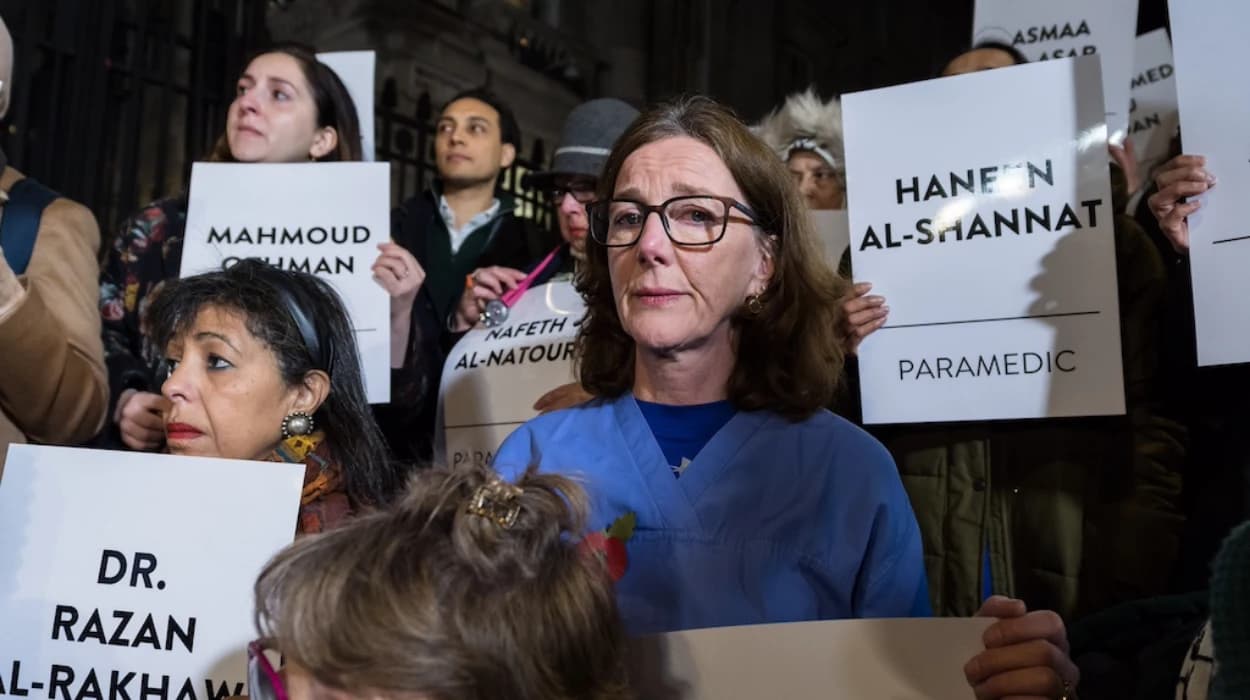A growing number of health workers in the UK and globally
are facing censorship, arrest, and discrimination for speaking out in
solidarity with Palestine amid ongoing violence and humanitarian crises. These
actions have drawn widespread condemnation from medical professionals, human
rights advocates, and legal challengers who call for accountability and
protection for health workers advocating for Palestinian rights.
Health Workers Arrested for Protesting in Solidarity with Palestine
As reported by Pulse's health desk, on 9 August 2025, a
protest organised against the proscription of the group Palestine Action saw at
least 13 health workers, including a retired GP, arrested within minutes of the
demonstration starting in Parliament Square, London. The protest had formed a
‘health block’ to highlight the continuous attacks on health workers in Gaza,
where over 1,500 healthcare workers have been killed since October 2023, a
figure condemned by the UN Human Rights Office. The health workers carried
banners referencing the Geneva Conventions and UN Security Council Resolution
2286, which protect healthcare workers in armed conflicts, alongside placards
stating, ‘I oppose genocide. I support Palestine Action.’ Dr Alice Clack, a
consultant obstetrician and former Médecins Sans Frontières practitioner,
condemned the rapid targeting and arrests of the protesters. Ali Rowe, a mental
health specialist attending the protest, described the police’s handling as
unprecedented in her experience.
The Wider Issue of Silencing Palestinian Health Advocates
The silencing goes beyond physical arrests. According to an
article by H. Akhrouf in Jacobin, Israel has killed over 1,400 healthcare
workers in Palestine. Yet, doctors and nurses in Britain who express solidarity
with Palestinian healthcare workers face systematic censorship and
discrimination. This includes denial of freedom of expression and professional
repercussions for speaking out amidst what many describe as an ongoing genocide
in Gaza.
In the UK, this silencing has extended to institutional
policies. A legal case brought against Barts Health NHS Trust revealed that
senior executives implemented a uniform policy banning visible expressions of
support for Palestine following pressure from the pro-Israel lobby group UK
Lawyers for Israel (UKLFI). This policy came into effect eight days after
UKLFI’s public lobbying campaign, raising allegations of discrimination and
censorship of pro-Palestinian voices within the NHS. UKLFI has a history of
legal advocacy supporting Israel and has sought to remove Palestinian cultural
expressions and artwork in public spaces, while controversially justifying
Israeli actions.
Ethical and Human Rights Concerns Expressed by Medical Professionals
Amira Nimerawi, a Palestinian health worker and CEO of
UK-based Health Workers 4 Palestine, articulated the pain felt by many within
the global medical community at the British Medical Association (BMA) Annual
Representative Meeting in June 2025. She highlighted that Palestinian
healthcare workers have endured indescribable losses, including colleagues
abducted, tortured, or killed, such as Dr Adnan Al-Bursh and Dr Alaa Al Najjar,
who buried nine family members, including her husband, also a doctor. The BMA
meeting saw overwhelming support for motions calling for the UK to end
complicity in what was described as a genocide and to protect health workers
advocating for justice. Nimerawi stressed the ethical obligation of medical
associations to condemn violations, hold perpetrators accountable through
international justice, and oppose military and financial support for ongoing
crimes. The message was clear: silence is complicity, and the medical community
must uphold the principle of "do no harm" by standing with
Palestinian health workers.
Global Health Community’s Call for Accountability
An editorial by M Alkhaldi published in the scientific
journal PMC underscores the failure of global health accountability towards
Palestinians. Despite international legal obligations which enshrine health as
a basic human right—absent of discrimination by race or political belief—the
right to health for Palestinians is systematically denied. Israeli authorities
impose severe barriers including blockades, permit denials for essential
medical travel, destruction of medical infrastructure, and withholding of
COVID-19 vaccines from Palestinians. These actions contravene international
humanitarian law and have caused unnecessary deaths and widened health
inequities. The editorial calls for an independent observatory composed of
global health professionals and institutions to monitor, report, and hold
accountable violations against Palestinian health rights, filling the gap left
by ineffective existing mechanisms. Such an observatory would ensure health
justice and accountability free from political censorship.
Impact on UK Muslim Healthcare Professionals
The British Islamic Medical Association (BIMA) conducted a
survey revealing the psychological and professional toll on Muslim healthcare
professionals and students in the UK stemming from the Gaza conflict. Many
reported feelings of isolation and being silenced within their workplaces,
contributing to mental health challenges and a sense that their professional
voices were being stifled when trying to speak on Gaza-related issues.
Legal Challenges to Censorship Policies in the NHS
In response to the suppression of pro-Palestinian expression, three NHS workers launched legal action against Barts Health NHS Trust’s uniform policy that bans visible political symbols, arguing it discriminates against their right to express solidarity with Palestinians suffering severe human rights violations. This challenge also highlights how external lobbying influences NHS policy to silence Palestinian support within healthcare settings, contravening NHS values of equality and freedom of expression.
The silencing of health workers speaking up for Palestine is a multi-faceted issue involving direct arrests, institutional censorship, ethical dilemmas, and legal battles. Medical professionals and health advocacy groups urge that defending human rights and health equity must transcend political pressures and biases. The global health community faces a moral imperative to uphold accountability, protect health workers, and amplify the voices defending Palestinian health rights without fear of retribution or censorship. This ongoing struggle is not only about Palestine but speaks to the integrity and humanity of the world’s healthcare systems and professionals.
